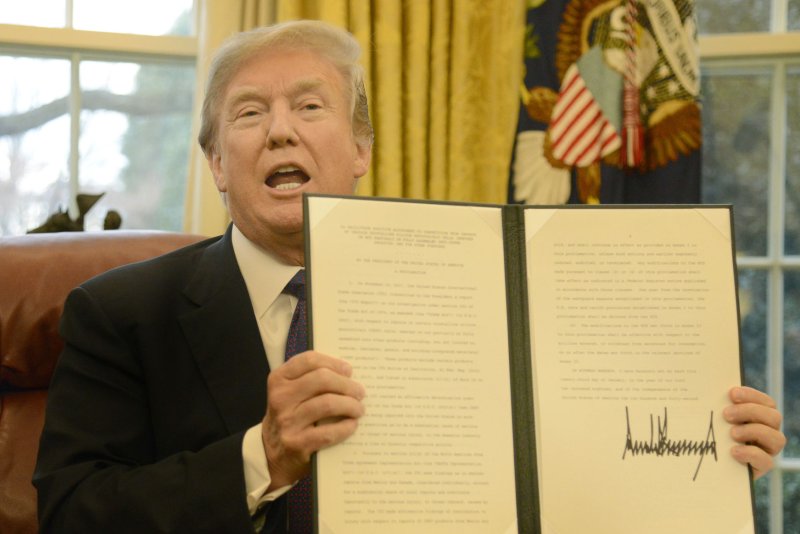1 of 3 | President Donald Trump holds up a Section 201 action after signing it in the Oval Office on Monday. The administration is issuing tariffs on imported solar panels and washing machines to protect American manufacturing companies against dumping by foreign countries, mainly China, and including South Korea. Photo by Mike Theiler/UPI |
License Photo
Jan. 23 (UPI) -- A U.S. decision to impose import tariffs on solar power equipment means Asian manufacturers may simply shift focus to expanding Asian markets, analysis found.
U.S. Trade Representative Robert Lighthizer said Monday that President Donald Trump imposed "safeguard tariffs" on imported solar cells and modules because of complaints those imports caused serious harm to domestic manufacturers.
"The president's action makes clear again that the Trump administration will always defend American workers, farmers, ranchers, and businesses in this regard," he said in a statement.
Trump, during a visit to Beijing in early November, said he was eager to improve the U.S. trade relationship with China, but so far, it "has not been, over the last many, many years, a very fair one for us."
That same month, the U.S. International Trade Commission delivered three separate sets of recommendations to Trump designed to curb imports of solar components, ranging from quotas to a tariff on imports of 35 percent.
The commission took up the case amid complaints that cheap parts from Asia made the U.S. sector less competitive. Suniva, based in the United States, and SolarWorld, whose parent is in Germany, said their tariff petition would lead to more jobs in the solar industry in the United States. According to an economic analysis done by Mayer Brown, a law firm representing the two companies, a tariff on solar cell imports could generate as many as 144,300 new jobs.
Frank Yu, a consultant at Wood Mackenzie on power and renewables in the Asia-Pacific, said the tariff will be a short-term jolt to Asian solar panel manufacturers.
"The duty barrier will shock Asian suppliers in the near term and they will likely switch gears to penetrate more into the growing Asian markets to offset the impact," he said in comments emailed to UPI.
Save solar cells with a capacity of more than 2.5 gigawatts, tariffs start at 30 percent and drop to 15 percent in four years.
The Solar Energy Industries Association, a trade group representing the interests of the solar power industry in the United States, said the solar manufacturing sector employed 38,000 people at the end of 2016 and only 2,000 of them made something other than solar panels. With these new duties, tens of thousands of jobs could be lost, not created.
"While tariffs in this case will not create adequate cell or module manufacturing to meet U.S. demand, or keep foreign-owned Suniva and SolarWorld afloat, they will create a crisis in a part of our economy that has been thriving, which will ultimately cost tens of thousands of hard-working, blue-collar Americans their jobs," SEIA President and CEO Abigail Ross Hopper said in an emailed statement.
A benchmark for solar competitiveness against other forms of energy outlined in the SunShot Initiative, a policy left over from President Barack Obama, was achieved three years ahead of schedule.















